What Is The Healthiest Nut Butter? (Your Nut Butter Buying Guide)
This post may contain affiliate links. As an Amazon Associate, I earn from qualifying purchases. Please read my disclosure.Peanut Butter. Almond Butter. Sunflower Butter. Coconut Butter. Soy Butter. Cashew butter. Walnut butter. Multi-nut butter. Nutella (or hazelnut butter). Reduced-fat. No-stir. Natural. Organic. Powdered. Which of these are the healthiest nut butter? This post is your guide to finding the healthiest nut butter: The difference between peanut, almond, sunflower, walnut, cashew, soy butters and which one is the best!
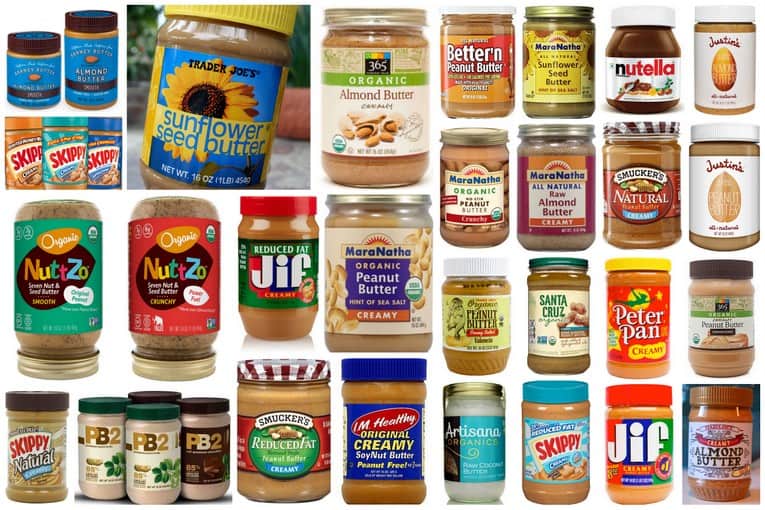
There are literally so many nut and seed butter options out there it can make your head spin.
And so many of them claim to be healthy, natural, low-calorie, a great alternative to peanut butter, etc. that it can be confusing to figure out which nut butter is actually the healthiest for you!
That’s where this post comes in 🙂
I have done the research and have found the best, healthiest, truly-good-for-you (and good tasting!) nut butters out there, and these are the results.
This is your guide to finding the healthiest nut butter for you and your family!
To start — is there a health difference between the categories of nut butter? For example…
Is Peanut Butter Good For You?
The short answer is, yes! Peanut butter is good for you in moderation, and if you don’t have any allergies (obviously). It’s a good source of plant-based protein, has healthy fats, contains vitamins and minerals like magnesium, potassium and zinc, and has some fiber too. It, like all nut butters, is relatively high in calories, which is why you don’t want to go eating a whole jar of peanut butter in one sitting. A 2 tablespoon serving has about 200 calories, 7g protein, 16% of the RDA for Magnesium, 15% RDA for Phosphorous, 7.7% RDA for Zinc, 28% RDA for Niacin, and 14% RDA for Vitamin B6. The main thing to keep in mind when determining whether a particular brand of peanut butter is good for you is to follow my guidelines below for the healthiest nut butter.
Is Almond Butter healthier than Peanut Butter?
Peanut, Almond and Sunflower Butter are the healthiest – as long as the brand you buy doesn’t include processed ingredients, sugar, or stabilizers (more on that in a sec). There are minor differences in vitamin/mineral content between the three, but in the quantities you’d eat them, it’s basically a wash. The main differences are with taste and allergy-related issues.
The rest of the nut butters are not as healthy (coconut, hazelnut, macadamia, pecan, walnut, cashew) — they are all higher in fats and lower in protein than almond/sunflower/peanut – so use these sparingly! While the fats from these butters are healthy, you can have too much of a good thing 🙂
Here are my Top 8 Tips for finding the healthiest nut butter:
#1 | The ingredients list should be short. Two ingredients max for a single nut butter. The ingredients should literally just be whatever nuts are in the butter (e.g. almonds), and salt (you can also get a no-salt version). So for an almond butter, you are looking for “Roasted almonds, salt” or “Raw almonds, salt” or just “Almonds.” Same for a peanut, cashew, walnut, sunflower seed or any nut butter you buy.
#2 | Organic is great, but the ingredients matter more. If your nut butter has the USDA organic seal on it, great! But if that same nut butter has “sugar, palm oil, etc.” on the ingredients list, you’re better off getting a non-organic nut butter that just has “peanuts, salt” on the ingredients list.
#3 | No-stir is a BAD thing!! I can’t stress this enough. Companies put “no stir” on the front of the label like it’s a benefit, but all that means is that some sort of palm oil or hydrogenated oil has been added to the nut butter to make it shelf-stable. Nuts are primarily fat. When you grind them up and store them, the fat should separate from the ground up nuts. Stirring is a good thing. (And while stirring nut butter can be a pain, I have found this awesome affordable tool that makes it so much easier and faster to stir nut butter!) Once you stir up the nut butter, needing refrigeration is another sign that your nut butter is healthy. Which brings me to…
#4 | Nut butters should NOT be able to sit out without going rancid. A lot of “no-stir” nut butters can also be kept in the pantry (non-refrigerated) once you open them. Again, this is because of either hydrogenated oils or palm fruit oil preserving the nut butter – which means the nut butter is too processed. The healthiest nut butter will need to be stirred, and all healthy nut butters should need to be refrigerated after opening.
#5 | Avoid these words on the label: honey/honey nut/honey roasted/honey flax, maple, flavored, vanilla, chocolate, nutella/hazelnut. Other than the nuts/seeds, and salt, no other ingredients should be added. All these terms mean is that the nut butter has tons of added sugar and is more like a dessert than a nut butter should be.
#6 | Reduced-fat is BAD. Reduced fat peanut or almond butters basically have the exact same calories as full-fat nut butter, but instead, to lower the fat content, a ton of sugar and other processed ingredients (corn syrup solids anyone?) are added to give the nut butter the “feel” of a full-fat version. Nuts have healthy fats that are good for you! Reduced-fat is bad. Full fat is good.
#7 | Sugar should NOT be on the ingredients list. Nuts are naturally sweet. If you see “sugar” or “syrup” on the ingredients list, don’t buy that nut butter! The healthiest nut butters will have no sugar added.
#8 | NO Palm Fruit Oil (or Palm Oil) and NO Hydrogenated Oils (or Hydrogenated Vegetable Oils, Partially Hydrogenated Oils) on the ingredients list. Why? See my note at the end of the post.
And now: My Healthiest Nut Butter Buying Guide!
Below are the best and the worst brands for peanut butters, almond butters, nut butter alternatives (peanut-free), peanut butter powders and reduced-fat nut butters.
Peanut Butter

The Best Peanut Butters
- MaraNatha Peanut Butter
- Whole Foods 365 Organic Unsweetened Peanut Butter (make sure it only has two ingredients: peanuts, salt)
- Smucker’s Organic Natural Peanut Butter
- Smucker’s Natural Peanut Butter
- Crazy Richard’s Peanut Butter
- Spread the Love Naked Organic Peanut Butter
- Trader Joe’s Organic Creamy Valencia Peanut Butter
- Santa Cruz Organics Peanut Butter
- Adam’s Peanut Butter
- Once Again Organic Peanut Butter
- Nutzo Organic Smooth Peanut Butter
All of these varieties above have literally two ingredients: peanuts, salt. Since Nutzo is a nut butter blend, their ingredients are: organic roasted peanuts, organic roasted cashews, organic roasted almonds, organic roasted flax seeds, organic roasted brazil nuts, organic roasted hazelnuts, organic roasted sunflower seeds, sea salt (which as you’ll see – are just the whole nuts/seeds and salt, so it’s great!) Smucker’s was a pleasant surprise. Even Smucker’s non organic version has these ingredients: Peanuts, 1% or less of Salt. All of these options have ~200 calories for 2 tbsp, ~16g fat, 1g sugar, and 7-8g protein.
The Worst Peanut Butters
- Skippy (Includes all of their varieties including Skippy Natural Peanut Butter)
- Jif (Includes all of their varieties including Jif Natural Peanut Butter and Simply Jif Peanut Butter)
- Peter Pan (Includes all of their varieties including their Whipped Peanut Butter)
- Justin’s (Includes all of their varieties)
- Any “no-stir” or flavored peanut butter varieties (Note: some of the brands above have no-stir versions of their peanut butters and honey roasted/etc. versions as well that should be avoided!)
Some notes:
Justin’s Classic is deceptive: the packaging looks like it should be healthy, but the ingredients list has Palm Oil. And their “Honey” version has these ingredients: Dry Roasted Peanuts, Organic Honey Powder (Organic Evaporated Cane Sugar, Organic Honey), Palm Oil, Sea Salt. Not good!
Skippy Natural/Jif Natural are also deceptive: the packaging looks like it should be healthy, but the ingredients list has Sugar, and Palm Oil in it. Definitely avoid.
All of Skippy/Jif and Peter Pan’s regular varieties have Sugar, Hydrogenated Vegetable Oils (Cottonseed & Rapeseed), Honey, Molasses, and Partially Hydrogenated Oils between them. Avoid at all costs!
Almond Butter
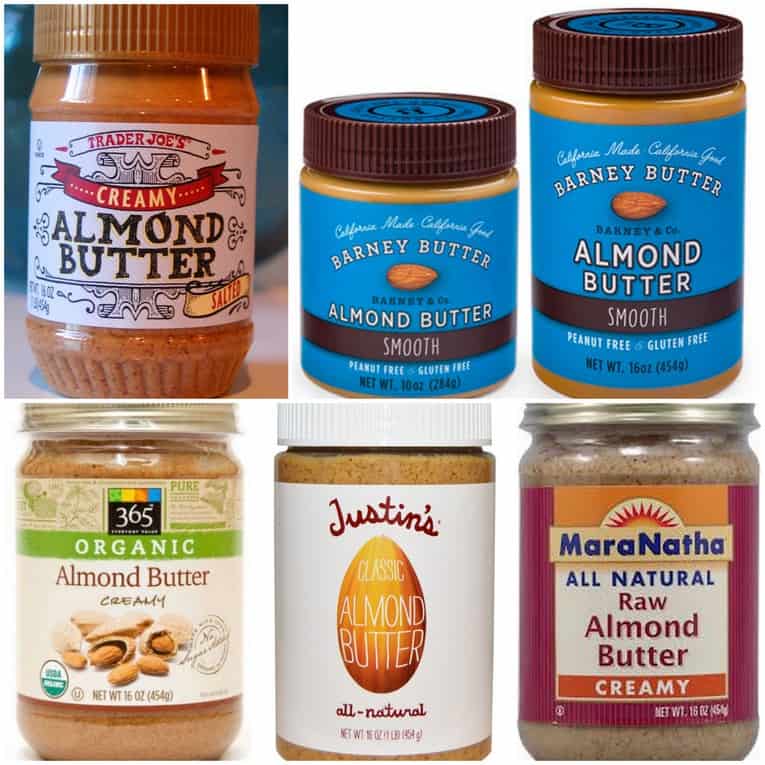
The Best Almond Butters
- MaraNatha Almond Butter
- 365 Every Day Value Almond Butter
- Whole Foods 365 Organic Unsweetened Almond Butter
- Spread The Love Almond Butter
- Once Again Almond Butter (also available in single serving organic packets!)
- Trader Joe’s Creamy Almond Butter
These guys have two ingredients: almonds, salt. It’s great! A 2 tbsp serving has about 190 calories, 17g fat, 2g sugar and 7g protein.
The Worst Almond Butters
- Barney Butter (All varieties)
- Justin’s Classic Almond Butter (All varieties)
- Jif Creamy Almond Butter
- Any flavored(e.g. maple, honey, etc.) or no-stir almond butters – including those varieties from Whole Foods or MaraNatha
Barney Butter is deceptive: Their packaging looks so healthy, but their ingredients list always has Organic & Fair Trade Cane Sugar, and Palm Fruit Oil on it. I don’t care if the sugar is organic or fair-trade. Sugar is sugar, and should not be in nut butters 🙂 Justin’s Classic has a similar issue!
Jif Creamy Almond Butter has these ingredients added: Sugar, Hydrogenated Vegetable Oils (Rapeseed, Cottonseed and Soybean), Sunflower Oil. Not good!
Nut Butter Alternatives (Peanut-Free)
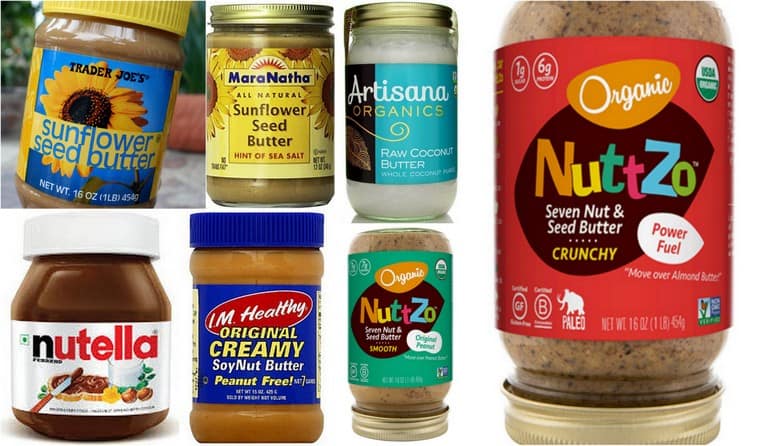
The Best Peanut-Free, Nut Butter Alternatives
- SunButter Organic
- Nutzo Power Fuel (Peanut Free)
- Vor Pure Sunflower Seed Butter
- Beyond the Equator 5 Seed Butter
- Once Again Sunflower Seed Butter
All of these brands are amazing. SunButter organic has only one ingredient: Roasted organic sunflower seeds, which is great! 2 tbsp runs you 220 calories, has 2g fiber, 1g sugar, 6g protein. Nutzo Power Fuel is awesome because it has: organic roasted cashews, organic roasted almonds, organic roasted brazil nuts, organic roasted flax seeds, organic roasted hazelnuts, organic roasted chia seeds, organic roasted pumpkin seeds, and sea salt. 2 tbsp = 180 calories, 3g fiber, 1g sugar, 6g protein.
Not Great, But Not Terrible Nut Butter Alternatives
- Trader Joe’s Sunflower Seed Butter
- Artisana Raw Coconut Butter
My main issue with Trader Joe’s sunbutter is that they add sugar to it. So a 2 tbsp serving ends up with 3g sugar instead of 1g or <1g. Other than that their sunbutter just has sunflower seeds + salt, so it’s not ideal because of the sugar but not terrible. Coconut Butter is essentially just ground up coconut. Artisana’s brand literally just has one ingredient: coconut. In that sense, it’s good. But coconut butter has almost no protein (2g per 2 tbsp) — so it won’t be as filling as a traditional nut butter.
The Worst Nut Butter Alternatives
- Nutella
- I.M. Healthy Soy Nut Butter
Nutella is marketed as this healthy breakfast “nut butter” spread, but it is literally a candy bar in a jar. Here are the ingredients: Sugar, modified palm oil, hazelnuts, cocoa, skimmed milk powder, whey powder, lecithin, and vanillin. The first ingredient is sugar! 2 tbsp of Nutella has 200 calories, 1g fiber, 21g sugar (more than a Snicker’s bar) and 3g protein. Avoid this!
I.M. Healthy Soy Nut Butter has Roasted Soybeans (Non-GMO), Naturally Pressed Soy Bean Oil, Granulated Cane Sugar, Maltodextrin, Palm Oil, Salt. Everything highlighted in red is why you should avoid this nut butter. If it was just soybeans and salt, it would be ok! The rest of these ingredients are unnecessary.
Powdered / Low-Calorie Peanut Butter
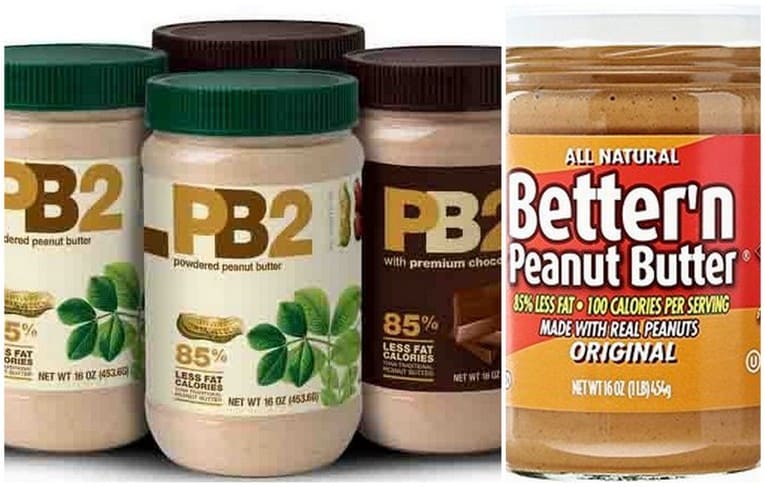
In general, I’m not a huge fan of powdered peanut butter as a replacement for regular peanut butter – because it just doesn’t taste the same and has a weird texture when mixed with water. That said, powdered peanut butter can work great in smoothies, curry sauces, cooked dishes, etc. Or, you can mix it with regular peanut butter to add a protein punch to your Peanut Butter sandwich.
The Best Powdered Peanut Butter
- Naked Nutrition Naked PB: One ingredient – roasted peanuts. 2 tbsp = 50 calories, 2g fiber, 1g sugar, 6g protein
- Crazy Richard’s 100% Pure Peanut Butter Powder: One ingredient – roasted peanuts. 2 tbsp = 50 calories, 2g fiber, <1g sugar, 6g protein
The Worst Powdered Peanut Butter
- PB2 (2 tbsp = 45 calories, 2g fiber, 1g sugar, 5g protein): Ingredients — Roasted peanuts, sugar, and salt. My main issue with PB2 is they add sugar to their peanut powder. It’s not needed!
- Better N’ Peanut Butter (2 tbsp = 100 calories, 2g sugar, 4g protein, 2g fiber): Ingredients — Peanuts (as defatted peanut flour and natural peanut butter), tapioca syrup, pure water, dehydrated cane juice, rice syrup, vegetable glycerin, soy flour, salt, tapioca starch, natural food flavors, paprika & annato (for color), calcium carbonate, lecithin, vitamins E & C. The majority of ingredients in Better N’ Peanut Butter are totally unnecessary, and are added to make the product taste and feel just like regular peanut butter.
Reduced Fat Peanut Butters
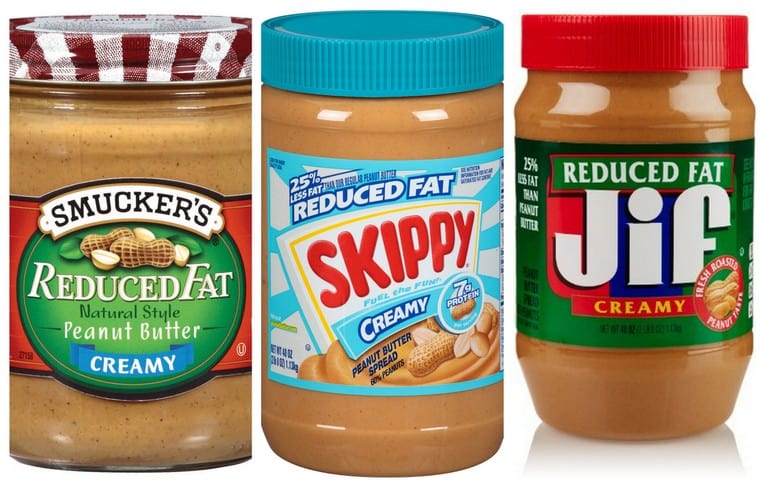
Never buy reduced-fat nut butter. Here’s why:
Just look at the ingredients list for Skippy Reduced Fat: Roasted Peanuts, Corn Syrup Solids, Sugar, Soy Protein Concentrate, Salt, Hydrogenated Vegetable Oil (Cottonseed, Soybean and Rapeseed Oil) To Prevent Separation, Mono- and Diglycerides, Minerals (Magnesium Oxide, Zinc Oxide, Ferric Orthophosphate, Copper Sulfate), Vitamins (Niacinamide, Pyridoxine Hydrochloride, Folic Acid). It’s a far cry from “peanuts, salt.”
Why should you avoid Palm Oil and Hydrogenated Vegetable Oils (or partially hydrogenated oils) in nut butters?
- They are preservatives and stabilizers. They are added to enhance the shelf life of the nut butter (which honestly is already super long when refrigerated – it doesn’t need to be enhanced).
- Partially hydrogenated oils contain trans fats which have been linked to heart disease.
- Fully hydrogenated oils are still bad for you in that they are very high in processed, saturated fats which are combined with vegetable oils to create a substance very similar to partially hydrogenated oils. I avoid them because they are unnecessary and the evidence is inconclusive on whether they contribute to heart disease (source). And frankly, they have no place in a nut butter.
- Palm oil, while not as bad as fully hydrogenated or partially hydrogenated oils – is still a preservative added to keep the nut butter from separating (e.g. “no-stir”). The FDA warned recently that “palm oil is not a healthy substitute for trans-fats” because a government study showed that the saturated fatty acids found in palm oil “are associated with elevated heart-disease risk factors.” The World Health Organization came to a similar conclusion. (source).
So Bottom Line: Choose Almond, Peanut or Sunflower Butter, (or a mixed nut butter that includes all 3), and make sure that the ingredients list just has the names of the nuts included and salt. No sugar, no added oils, nothing else. For allergy-safe lunches, Sunflower Butter is the best choice.
If you’re looking for more grocery tips, check out these helpful guides
- Healthiest Baby Food Pouches
- Best Multivitamin for Kids
- Healthiest Milk Buying Guide
- Healthiest Bread Brands Guide
I hope this post helps you find the best nut butter for you and your family! And to sum it all up, here’s a handy infographic that you can print out and take with you when you’re grocery shopping!
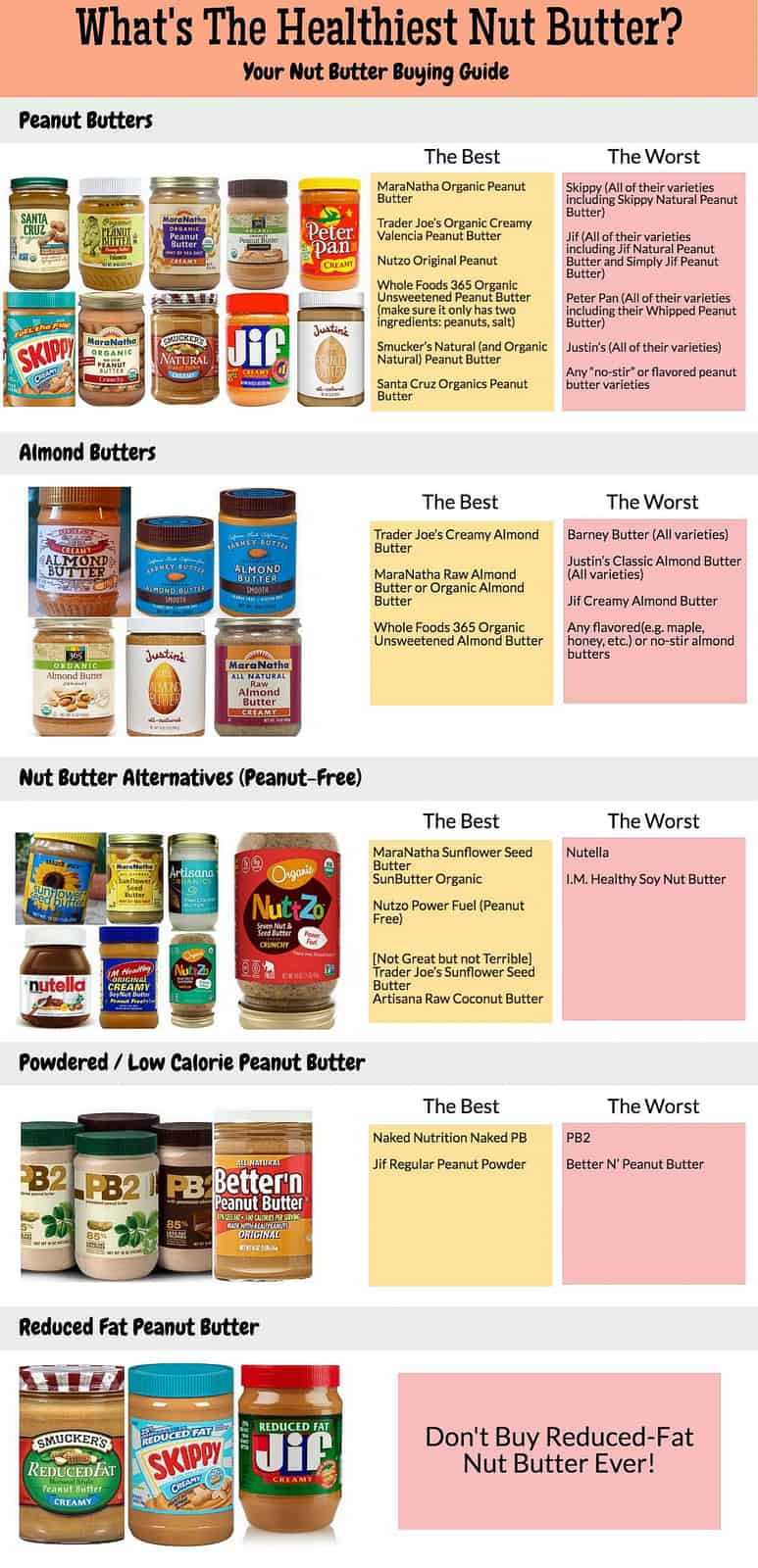




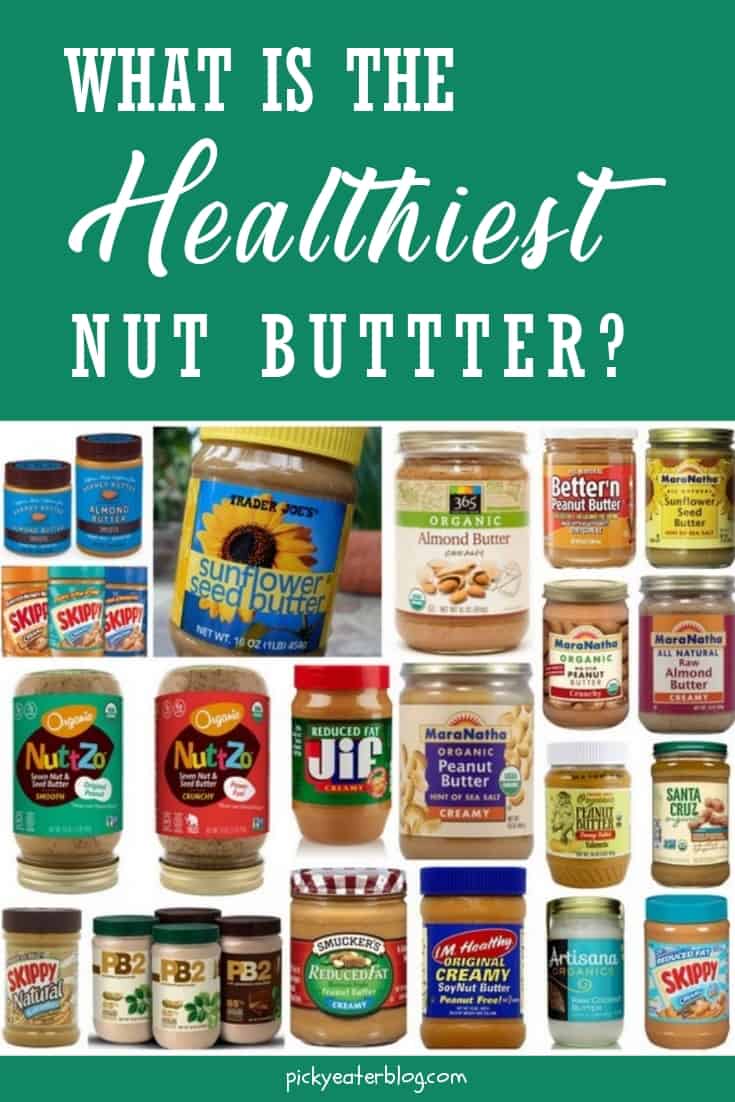

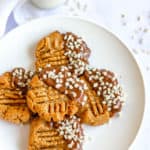
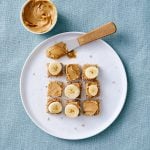








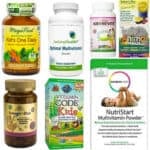
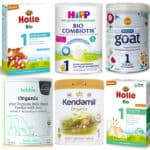



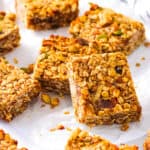




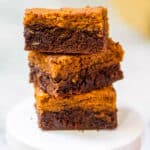


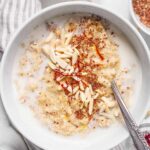
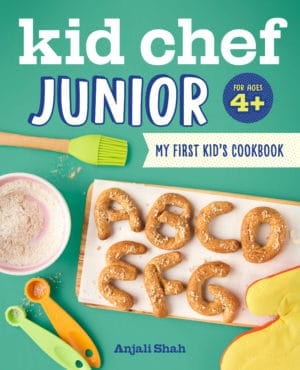


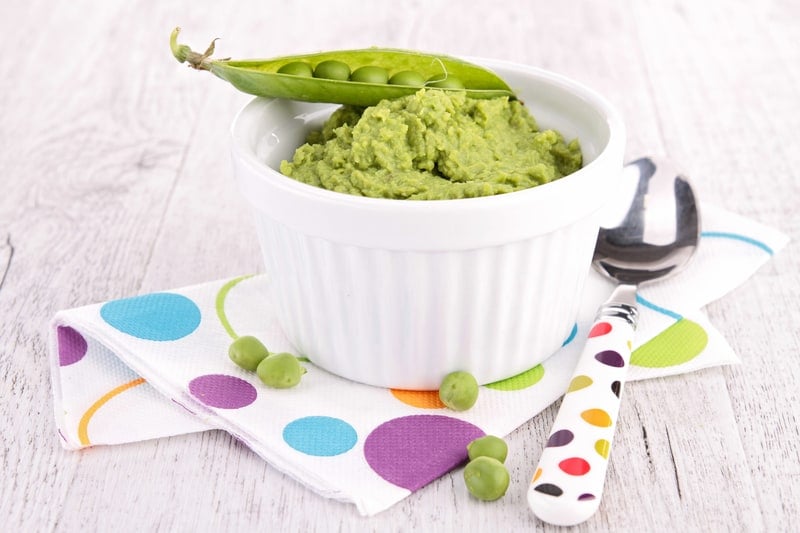
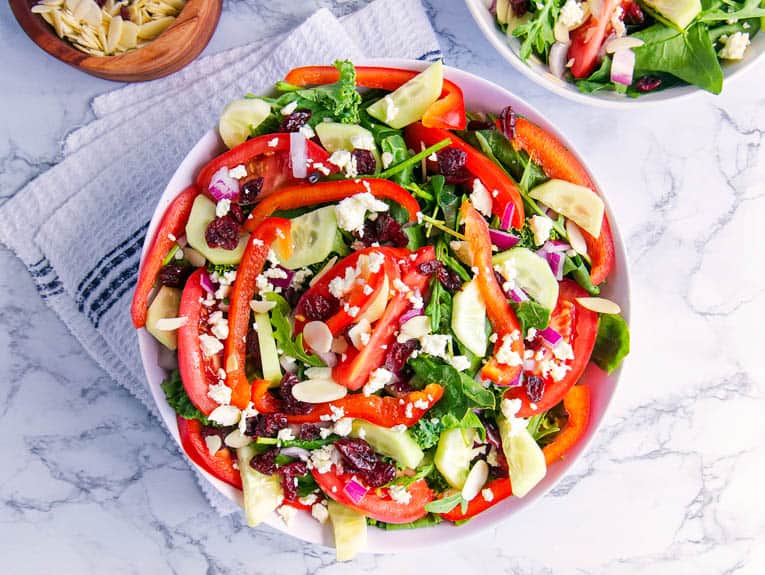


Great info! Trying to get healthier options in my day today diet and this was super helpful! Thank youu!
Thanks Maria! So glad it was helpful! 🙂
Since many of the peanut butters you ranked have the same ingredients, I wish you’d said why you rank one above the other. This would be helpful if taste / texture preferences are different.
Hi Ann! This is actually not a ranking, but more of a curated list of the best overall peanut butters. All of them taste great – and like you said most of them have the same ingredients. I leave it up to the reader to determine the best one for them based on this list — since different factors may be more or less important to different people e.g. price, dark vs. light roasted, organic vs. not organic, with or without salt, etc. All of the peanut butters, in my opinion, are equally good depending on what you are looking to “optimize” for! Hope that helps!
What about Artisana Raw Almond Butter?
Hi Michelle! Artisana Raw Almond Butter is perfect! It has just one ingredient: organic raw almonds 🙂
hi! what can you tell me about “earth balance” peanut butter with flaxseed?
Hi Valerie! I wouldn’t recommend it. They add sugar to the peanut butter (in the form of agave syrup, but that’s still acts just like regular sugar in your body), and they add peanut and palm fruit oil as well. I’d choose one of the other nut butters on my list instead!
Awesome info perfectly laid out! My question is if experts are saying sunflower oils are high in inflammatory Omega 6’s, how does this fare for sunflower butter? Thx!
Hi! Peanuts are also high in omega 6s — and when it comes to omega 6 fats, it’s not an “all or nothing” approach – it’s more about moderation. Having 1-2 tbsp of nut butter (peanut, sunflower, etc.) per day is completely fine – the problem comes when your daily intake of omega 6 to omega 3 fats is off. So when it comes to any of these nut butters, moderation is key, and you should also make sure you’re getting a healthy dose of omega 3 fats on a daily basis (from fish oil, flaxseeds, etc.). Hope that helps!
What do you think of barneys powdered almond butter?
Hi Mackenzie! It is great! Only has one ingredient – blanched almonds so it’s a perfect choice.
Amazing information!!! Thank you so much for posting this for us! So incredibly helpful in making wise healthy choices for my family! Have you researched Kirkland almond butter? That would be the Costco brand that I purchased and it appears healthy, regarding ingredients!I so love your blog and all your great information you provide for us! Thank you so much!!
Hi Teresa! I’m so glad this post was helpful for you! I have looked at Kirkland Almond Butter and I think it’s great — I think it only has either just “almonds” or “almonds, salt” as the ingredients which is ideal!
Can you talk about RX butters?
Hi Christina! RX Nut butters are fine, but they actually only have about 1-2g more protein per serving compared to just regular peanut or almond butter. And because of the dates they have about 3g sugar (vs. 0g sugar per serving for peanut/almond butter). The dates in RX butters are not really needed since nut butter tastes great without being sweetened. RX butters are also on the more expensive side – about $8-11 per jar. Given that, I’d probably just go with regular peanut or almond butter over RX butters, but if you prefer RX butters they are ok!
Excellent post, my friend. I will be using your list going forward. Thanks a million for sharing.
No problem at all, glad it’s helpful!
If you like natural nut butters but don’t look forward to stirring them, try EZPB – a new way to stir nut butters in various size jars. Sold on Amazon – search for “EZPB mixer”.
Oh awesome tip! Thanks Jill!
Very comprehensive post! When I was researching this topic, I was shocked to learn that Justin’s contains palm oil. It’s so delicious and marketed as “natural” and “simple” but it’s not the best for our kids.
Thanks Julie! And I totally agree about Justin’s – their marketing is amazing, their products are not!
Yey! my selections made the best-of lists. I love Trader Joe’s peanut butter. It has the simplest ingredients and tastes amazing.
Yay!! Nice job picking healthy nut butters Cindy! Totally agree about TJs – one of my favs!
Thank you so much for this. I am always preaching that there should only be two ingredients (nuts and salt). I never could understand why Justin’s is always being talked about (it has palm oil). I make my own nut butters that are amazing. I have also tasted your best list and bravo!
Thanks so much Christy! I totally agree with you – Justin’s has done a great job with marketing because they are everywhere, and everyone thinks they’re healthy but they’re not! Love that you make your own nut butters too!
This was so informative. Is there an almond butter powder you recommend? I started weight watchers to lose about 30 lbs. but I want to make better choices within my points. I found a recipe that calls for almond powder which is lower in calories than using whole almonds for the sauce. Thank you. I would like to follow you as well. Do you have a facebook page or send out emails of healthy info?
Thanks so much Lizzie! For almond butter powder, I love this one from Barney Butter. And yes I do have a Facebook page! You can find it here. And I also send out emails with healthy tips — I just added you to my list there! Hope that helps! 🙂
waaaaa so many choices, honestly! But we often buy either Skippy, Jif, and Trader Joe’s in the house. My mother in law likes the almond butter better because not only it’s healthier, it’s not sweetened, too.
Trader Joe’s is a great option for both peanut and almond butter! I’d stick to that for sure! 🙂
Interesting post. Never thought of paying that much attention to buying nut butter — but next time I buy some I’ll use your post as a guide!
Thanks so much! So glad it was helpful!